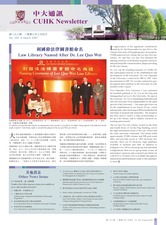Colorectal cancer is the second most common malignancy in Hong Kong and men over the age of 50 years is the group with the highest risk. Although colorectal screening tests are available and proven to improve survival, the public awareness is low and public acceptance of screening procedures is unsure.
The Institute of Digestive Disease (IDD) of the Faculty of Medicine and the Department of Sociology at the University conducted a telephone survey from September to November 2006 on 1,004 subjects randomly selected from the community. There were 484 men and 520 women with a third of interviewees being above the age of 50 years.
Among the subjects, 99 (10%) had undergone colorectal cancer screening in the past. Six factors were found to predict higher acceptance of screening:
- knowledge of symptoms of colorectal cancer;
- knowledge of risk factors of colorectal cancer;
- little perceived discomfort, embarrassment and complications of screening tests;
- having necessary resources (financial support, time and knowing where to go ) for screening tests;
- having health insurance coverage;
- recommended by family doctors.
This study also showed that women and people with a higher education level have better knowledge of the symptoms, associated risk factors and screening procedures of colorectal cancer.
The subjects were then divided into four groups for comparison. The four major findings from this comparison were:
- Overall, men have less knowledge about the symptoms, associated risk factors and screening procedures of colorectal cancer compared with women.
- Men have less time for screening test.
- Older individuals have less financial resources for screening test compared with younger individuals.
- Older individuals have less health insurance coverage compared with younger individuals.
The findings show that men above the age of 50, the highest risk group of developing colorectal cancer, have the poorest knowledge about symptoms of colorectal cancer, the associated risk factors and available screening tests for colorectal cancer. They also have the least awareness about their risk of developing colorectal cancer.
The researchers conclude that:
- Educating the public about symptoms, risk factors and available tests of colorectal cancer disease is of paramount importance in promoting acceptance of colorectal cancer screening;
- Men above the age of 50 years have the highest risk, yet the least understanding of the condition and the associated risk factors, thus they should be the target group for education;
- Family doctors should be engaged in colorectal cancer screening as they are the one who will influence the public's attitude.




















































































































































































































































































































































































































































































































































































































































